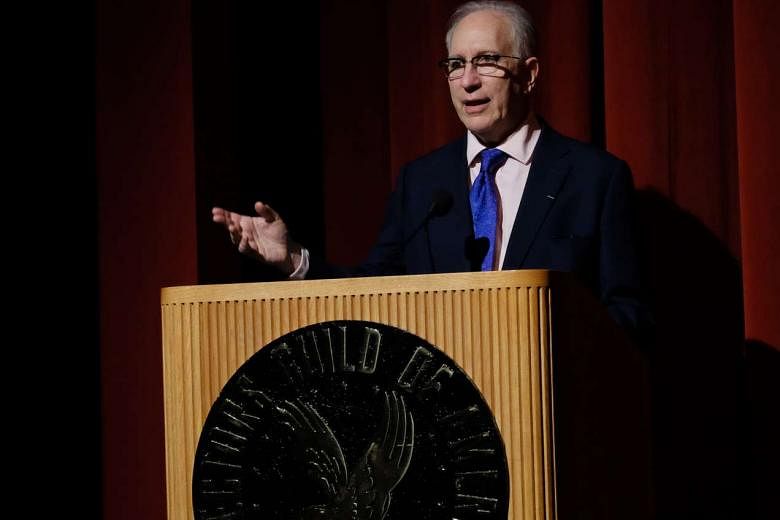LOS ANGELES • Unions representing 12,000 Hollywood writers said on Monday that members had overwhelmingly voted to authorise a strike, bringing show business closer to its first production shutdown in a decade.
Leaders of the Writers Guild of America, East, and the Writers Guild of America, West, announced the results of an online strike authorisation vote in an e-mail to members.
The unions said that 6,310 eligible members voted and 96 per cent of the vote was in favour of a strike.
A three-year contract between the guilds and the Alliance of Motion Picture and Television Producers, which represents the makers of films and TV series, expires at midnight on May 1.
Negotiators were set to resume talks yesterday, with funding of a failing union health-care plan a sticking point.
"We thank you for your resolve," the union e-mail said. "We are determined to achieve a fair contract."
In a statement, the producers' alliance said: "The companies are committed to reaching a deal at the bargaining table that keeps the industry working. The 2007 writers' strike hurt everyone. Writers lost more than US$287 million in compensation that was never recovered."
If no agreement is reached, a walkout could happen as soon as May 2 and potentially idle tens of thousands of workers - not just writers but also the drivers, caterers, set carpenters, dry cleaners and other service providers who make Hollywood's wheels turn.
Writers picketed for 100 days in the 2007 strike, bringing TV production to a halt and causing US$2.5 billion in economic losses in Los Angeles, according to government economists.
A strike would first affect late-night talk shows and soap operas that use guild writers, sending the programmes into repeats or forcing hosts to ad-lib.
The production of scripted TV series would slow down, as producers burn through scripts. Networks would rely more heavily on news, sports and reality programming. Moviegoers would not experience immediate effects; studios have finished shooting most summer and autumn movies.
Strikes are awkward for Hollywood unions because of optics: The workers involved are not coal miners struggling to feed their families. Some television staff writers earn hundreds of thousands of dollars a year.
A few elite wordsmiths - Chuck Lorre and Shonda Rhimes - earn millions.
But leaders of the two writers' unions, which bargain as one, say that the middle-class majority of their members are struggling as never before, even as television production booms in the video-streaming age and some blockbusters take in more than US$1 billion (S$1.39 billion) at the worldwide box office.
Networks are ordering fewer episodes per season - as few as 10 compared with 22 just a few years ago - so series writing jobs pay less than they once did.
At the same time, staff writers can work for only one series at once, taking them off the market for up to a year. And broadcast network reruns do not attract many viewers anymore, limiting residual payments.
On the movie side, studios have cut way back on what is known as development, or the polishing and reworking of scripts to produce a good one.
"There's a wild disparity between what writers are paid and the profits that are generated from their work," Mr Howard A. Rodman, president of the West guild, said in an interview this month. "If you look at the budgets of television shows, the part allotted for writing is generally 2 per cent. That strikes me as a very small amount given the importance of writing to the enterprise."
Health care is also a major union concern. This is partly because it provides extremely generous benefits - by some measures, studios say, better than coverage offered to other Hollywood unions - the writers' health fund has begun to run steep deficits.
Writers want studios to help make up the shortfalls, which can total tens of millions of dollars a year.
The movie and television companies point to systemic industry problems as reasons they must limit improvements to the Writers Guild contract.
Studios contend that they are facing an uncertain future, with streaming services threatening their enormously profitable cable operations.
With the rise of Netflix, HBO Go and Amazon, consumers are downgrading cable TV packages or foregoing connections altogether.
Media companies have their own optics problem.
While they contend that they are unable to give writers more than small raises, most have boasted to Wall Street of climbing profits. And pay for media moguls has been rising.
Earlier this month, CBS disclosed that its chief executive, Mr Leslie Moonves, received a 2016 pay package worth US$69.6 million (S$96.9 million), a 22 per cent increase over 2015, when the company did not perform as well.
NYTIMES

